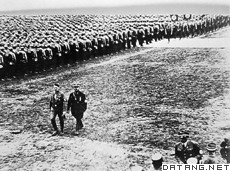1) Japanese militarism


日本军国主义
1.
The Social and Historical and Cultural Origin of the Japanese Militarism;


日本军国主义产生的社会历史文化渊薮
2.
It is of operation significance to the guarding of the threat of the revival of Japanese militarism.
通过对汪精卫“大亚洲主义”的剖析 ,进一步揭露日汪侵略、卖国的本质 ,驳斥日本右派言论 ,警惕日本军国主义复活的威胁 ,具有一定现实意义。
3.
In this paper,the author objectively analyses the cause of Japanese militarism s unconditional surrender,especially Chinese function in anti-Japan fasc.
本文从总结历史经验出发,对日本军国主义无条件投降的各方面原因,特别是中国抗日战争在战胜日本法西斯及世界反法西斯战争中的地位和作用,作了历史地客观地分析。
2) the thought of Japanese militarism


日本军国主义思想
1.
Meanwhile, the origins of this characteristic came from three aspects too, which were "the thought of Japanese nationalism education", "the thought of Japanese militarism" and "the spirit of Bushido".
而形成伪满体育"灭私奉公"核心思想的渊源主要有三个,即"日本国家主义教育思想"、"日本军国主义思想"和"日本武士道精神"。
3) Japanese imperialism


日本帝国主义
1.
During the Anti-Japan war, Japanese imperialism made the culture serve the war of aggression against China.
抗战时期,日本帝国主义为了使文化为侵华战争服务,在沦陷区实施的奴化思想教育,是一种具有欺骗性、侵略性、组织性和高度的垄断性等特点的文化现象。
2.
The purpose of this article is to explore the limitations that this theory maybe have from the angle of the relations with the Japanese imperialism.
本文试图以该理论与旧日本帝国主义的关系作为切入口,探讨该理论可能具有的局限性。
3.
In order to turn China into its colony, the Japanese Imperialism launched the September 18th Incident to invade the northeast of China on September 18th, 1931.
日本帝国主义为了把中国变成它的独占殖民地,于 1931年9月 18 日悍然发动了侵略我国东北的“九·一八”事变。
4) Japanese imperialist


日本帝国主义
1.
During the period of the rule of Japan and "Manchukuo" Puppet regime,Japanese imperialist implemented the policy of "Immigrating Japans to Korea,so doing Koreans to Manchukuo" and migrated Koreans to Northeast China according to plan and purpose,excluding excessive population to exploit paddy field and set up a military-and-gain base to realize "agricultural national defense".
日伪统治时期,日本帝国主义有计划、有目的的向东北移植朝鲜人,实行"日人植鲜、鲜人植满"的政策。
2.
During the period when northeast China was occupied by Japanese army,Japanese imperialist forced Chinese people to embrace uppermost divinity which they believed in,and enslaved people s mind.
论述了东北沦陷时期,日本帝国主义迫使东北人民信奉日本的天照大神,推行"惟神之道",在精神上奴化广大人民。
6) Japanese imperialists


日本帝国主义
1.
When half of the China was annexed by the Japanese imperialists, a so-called agricultural immigration policy was concocted in the enemy-occupied areas, and the productive forces were seriously destroyed.
日本帝国主义吞并了中国半壁江山 ,在沦陷区 ,炮制农业移民政策 ,毁坏了中国的农业生产力。
补充资料:军国主义
| 军国主义 militarism 把国家完全置于军事控制之下,使国家生活的各方面都为军事侵略目的服务的思想和政治制度。现代军国主义是帝国主义战争和侵略政策的产物,又是推行侵略战争政策的一种手段。根源在于资本主义国家内的阶级压迫与剥削。军国主义对内把国家的政治、经济、文化等各个方面都纳入军事侵略和战争的轨道,向人民灌输侵略战争的思想,实行军事独裁的恐怖统治;对外推行霸权主义、殖民主义、侵略和战争政策,掠夺、奴役、控制和颠覆其他国家,以至发动干涉战争。 第二次世界大战前夕的德国和日本都是典型的军国主义国家。1933年A.希特勒在德国建立起法西斯政权后,疯狂进行扩军备战。军火工业迅猛发展;在全国实行普遍义务兵役制,正规军扩充至60万人,包括强大的空军和海军力量;同时大肆宣扬沙文主义、民族仇恨、特别是反犹太主义,以及扩充“生存空间”的舆论。希特勒军国主义统治下的德国终于成为第二次世界大战的策源地之一。1868年日本明治维新后,在发展资本主义的同时,迅速走上了军国主义道路。对内推行以效忠天皇为核心的军国主义教育,在“富国强兵”的口号下扩军备战;对外则制订了侵略计划,宣称要使大日本帝国的国威布于四方,要以侵略战争征服世界。19世纪末~20世纪中叶,日本始终没有停止对中国、朝鲜以及整个亚太地区的侵略扩张,直至第二次世界大战后,日本军国主义的统治才彻底崩溃。
饱受军国主义统治之苦的世界各国人民仍在警惕着当今世界军国主义势力的复活。 |
说明:补充资料仅用于学习参考,请勿用于其它任何用途。
参考词条
